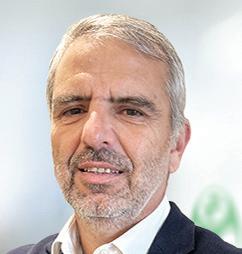
10 minute read
CFO SPOTLIGHT: THE NUMBERS GAME

Gambling Insider speaks to some of the industry’s biggest CFOs to nd out the trials and tribulations associated with the role, as well as how each manages the landscape of the modern nancial gaming eld


Everybody knows the job of a CEO: it is to lead, to steer the good ship of a company through calm and treacherous waters, executing a vision of how each would like their specific company to operate. Depending on how well a CEO does, this determines the length of time their tenures will last, with some spanning decades and others mere weeks. However, a post considered to be paramount to the success of a business is the CFO, the role of Chief Financial Officer.

To be a CFO, one must possess many traits: a good grasp of mathematics is key, as is the ability to understand large figures and sums; it is the presentation of detailed financial information, though, that the Board and the public can clearly make sense of that holds the biggest weight. Any details that are wrong can lead to serious errors in company direction; it can mislead shareholders and, in extreme cases, lead to severe regulatory and punitive action. It is not just how these details are presented, either, but what they entail. The role of CFO therefore comes with responsibilities some may feel are too much of a burden to carry. For those select few that do choose to carry the torch, each will know the pitfalls and benefits that come with the title.
First, studies show that a CFO will make the third-highest salary among C-level executives (behind the CEO and COO) – with a reported median salary of $363,500
– compensation that feeds into the fact that CFOs are statistically the people that move around the most. In short, they are hired and fired faster than the rest of their peers. In the case of Wynn’s Julie Cameron-Doe, her salary has been made public by the gaming giant, earning $950,000 – way above the average CFO, with Wynn's CEO Craig Billings taking home $2m.
Or is it down to the idea that a CEO will generally believe a change in CFO can provide the quickest sharpening of company finances – without damaging their own position first? Over the next few pages, Gambling Insider explores the role of the CFO in gaming and how a select few can shape the post and the industry through their work. We reached out to four of the industry’s biggest CFOs, each of whom spoke exclusively to GamblingInsider about how they address the challenges of their role.
First there is Flemming Pedersen, the CFO of super affiliate Better Collective, dialling in from the company’s offices in Denmark on a warm spring day. Second, the Bragg Group’s Ronen Kannor gives his opinions from Israel – on a national holiday no less. Third, Gonzalo de Osma one of the two CFO’s at EveryMatrix opens up on the topic of his job, while offering his insight into the industry. Finally, David Jennings,
CFO of US sportsbook giant FanDuel, also shares his opinions on how the role operates within the gambling industry, and in a business as a whole from the company’s headquarters on ParkAvenue South in New York.

The four CFOs openly reveal their thoughts on a number of subjects their roles relate to, including remuneration, the importance of their relationship with the company’s CEO, life expectancy within the CFO role and the benefits of having a good infrastructure around them.

YOU GOT WHAT IT TAKES?
As we start the conversation, first the big overarching question is asked; simply put, what does it take to be a successful gaming CFO? In New York, FanDuel’s Jennings begins the conversation, highlighting the impact of putting the right controls in place: “Well, first, the CFO must also make sure that the right internal controls and procedures are in place to protect the business – because ultimately, more than anything else, for a CFO to be successful, he/she must build a team of talented, smart, driven people with complementary skill sets.”
It is a perspective that EveryMatrix’s De Osma expands upon in his comments, discussing having the right understanding of the company, as well as operating independently with a ‘true voice.’ “A CFO must have a perfect understanding of the business he or she is in whatever it is – the deeper knowledge the better. Only from that point on can you contribute effectively and consistently with the CEO, and other executives and operational managers, offering best practice and advice; and presenting a true and independent voice.”




However, Better Collective’s Pedersen counters this point. Indeed, he believes a CFO of a gaming company does not absolutely need to know the sector, telling Gambling Insider: “CFOs in the gambling industry have the advantage of not necessarily needing industry-specific background, but it is crucial to comprehend and adapt quickly to the business.” Though the trio have different opinions on the roles they have, each speaks about contributing effectively with the right controls and, crucially, demonstrating adaptability.

THE TEAM BEHIND








The conversation then moves to the subject of the importance of having the right team in place – something that Bragg’s Kannor discusses with relish, highlighting the importance of building an ‘ecosystem:' “My philosophy in management is that the less you need it, the better manager you are. And I believe that reporting is an ecosystem. Building a strong relationship with your team is extremely important and you need to assemble this team based on your targets, what you’re trying to achieve and your management approach. It’s an interesting dynamic.”
EveryMatrix’s de Osma wholeheartedly agrees with Kannor and how imperative it is to construct a team, describing it as “by far and away the most important responsibility.” The CFO gives further weight to the team atmosphere by stating that the role cannot be done individually: “The success or failure of a manager and his or her responsibilities very much depends on this. There’s no way a manager in a medium or large company can do all this alone.”
Jennings backs this up in his comments, remarking that the structure must also be open to evolution: “There are two components here. There is putting the right structures in place and then there is the talent you hire to fill those positions. As an organisation evolves, the supporting structure must evolve also.” Jennings further adds that the company must not see the finance department as a ‘source of challenge:' “For the CFO function to work properly, we must ensure there are no silos within finance, and no silos between finance and the wider organisation. Once that culture is in place, the organisation sees finance as a partner rather than a source of internal challenge. That is very powerful.” Interestingly, each CFO pushes the concept of a team working as an ecosystem with flexibility – however, Jennings’ dialogue on the wider role of the department in a business is a reminder of the collaborative effort required.
THE CEO/CFO BOND
This leads the discussion to the kind of relationship a CFO must have with the CEO – and how that bond can affect the business’ C-level structure. For Pedersen, who believes the bond is sacrosanct, his close connection with CEO Jesper Søgaard was forged by the times the pair spent together flying across Europe trying to raise money for the business’ IPO (initial public offering): “We embarked on a joint endeavour of traveling to the capitals of Europe to raise funds and market the planned IPO. This dynamic defined our actions during that period.”


Pedersen goes on to talk more about how the pair have maintained their connection since the start: “The CEO and I established an alignment before commencing our collaboration and, as you can see, we have maintained a very close relationship. In fact, the CEO sits in the office adjacent to mine, and we engage in frequent daily interactions – except for today when he is traveling,” the CFO adds with some humour. However, for Ronen Kannor at Bragg Group, he sees the dynamic slightly differently. He highlights the importance of the relationship the pair must share, saying: “They have to work together, hand in hand and trust each other, which is also an important part of ensuring the alignment between the strategy and financial targets. It’s teamwork. We’re talking about personalities that normally have to work very, very closely together.”
However, Kannor also notes that the roles are not perhaps linked by blood, “the CEO and CFO are not appointed together in the same position. Sometimes the CFO is there, while the CEO is replaced and sometimes the CEO is there while the CFO is replaced.”





Whereas Jennings believes the relationship between the pair helps to derive a “one-team” culture. He tells Gambling Insider: “the relationship between CEO and CFO is somewhat unique and the key to a successful partnership is trust. When trust has been built, the CEO comes to rely on the CFO for far more than just the output of the numbers.”
Further, Jennings highlights the strategic vision that should be shared between the two roles, stating: “What is also absolutely essential is that the CEO and CFO are fully aligned on what the strategy for the business should be. That drives where we direct our investments and, as importantly, where we will not.I believe that percolates throughout an organisation and helps to cultivate a ‘one-team’ culture.”

Stress
The experience of sitting at the C-level table is one that can undeinably have its ups and downs on a person, and the CFO is not immune from such feelings. Naturally, then, as part of our discussion, the subject of stress comes up. GamblingInsider asks the executives about how intense their positions are and the effect it has on them personally.
Pedersen, calmly sat at his desk in Denmark, smiles and (much like his demeanour suggests) admits “he doesn’t consider his role stressful,” adding that his relationship with the CEO is a big factor as to why he hasn’t felt stress in his role. Meanwhile, de Osma furthers the answer given by Pedersen, telling us that, so long as the CFO feels “well supported by the team” around them, then it is “not stressful.”







Hard Figures
Assessing the position of CFO from the outside, many might think it comes down to the figures – if the numbers don’t prove to be where the Board wants them to be, it amplifies the job the CFO is doing more so than every other C-level executive. However, when this is put to our CFOs, asking if each of them believes the post comes down to hard figures more than their peers, the response is mixed.
For Kannor, should the figures slip, it is an issue that comes from a number of factors – internal and external to the CFO’s office: “Sometimes delays can occur due to external factors such as customer-related issues. In such cases, it’s important not to solely focus on the numbers themselves, as they are a reflection of how the business is progressing. You need to monitor and sense how each customer is performing, understanding that some may be doing better while others may be performing less favourably. When evaluating team performance, especially in terms of budget and operational execution, it’s essential to consider the bigger picture. Therefore, it’s important to assess things within the context of the broader scheme of operations.”
Meanwhile, Jennings believes overall structure and long-term vision should be more important than immediate benefits and short-term profits. “If decisions were solely made based on what impact they are going to have on the numbers, then organisations would likely never invest in certain things that advance the strategic positioning of the business. At the end of the day, long-term sustainable returns should be what drive strategy and decision-making, even if the 'hard figures' are less compelling in the short term.”
As the discussions continue, it becomes clearer that each CFO sees long-term planning as the key to sustained success.
Kannor even attributes his philosophy of long-term vision to Sir Alex Ferguson’s domination at Manchester United football club. He tells Gambling Insider : “I think every company should have a strategic view of at least 10 years, knowing where they want to be. And they need to reverse engineer it, meaning they don’t start planning from the first year. Instead, they begin with the 10-year plan and work backward. Sir Alex Ferguson had a 10-year vision and consistently met both short-term and long-term goals. This is why he remained in his position for such a long time.”
Remuneration








Finally, the conversation turns to the delicate topic of remuneration. As we have already alluded to, some research has found that the CFO role is the third-highest paid at C-level (behind only the CEO and COO), but how much does that pay into the thinking of the person chiefly responsible for a company’s financial performance?
For Pedersen, the answer is very little. The CFO highlights that he is a shareholder at Better Collective, too – yet he and his COO and CEO colleagues try and separate this from the work, as he knows his position comes with a competitive package. “I think, actually, it’s very company-specific. Being a shareholder is one thing, but if you continue in an executive position, that should have a competitive package with it. And there, we benchmark with our Board and our remuneration committee.”
Additionally, Kannor is not too concerned with his financial package, as it is decided by a compensation committee at Bragg. “I never have to ask for a raise as it is determined automatically (by the committee). That’s the advantage. I always say that I never ask for a raise; it either comes or does not come depending on market conditions.” However, Kannor agrees that it is entirely down to the company handing out the cheques, adding: “The remuneration of a CFO depends on the company in question. The remuneration of a CFO joining a distressed company may differ from that of a CFO joining an established company with a consistent performance over the past decade. Different requirements call for different remuneration structures.”
It seems none of the CFOs are overly worried about their remuneration packages and are, instead, focused on getting their businesses to a point where they are as noteworthy as possible.

Gonzalo de Osma, EveryMatrix
The Cfo
Within the gambling industry, it seems the role of CFO does buck the trend within the greater realm of business – even though it also, according to our interviewees, doesn’t necessarily require a person with a gaming background to do it. When assessing the different ways that all four CFOs set themselves up at FanDuel, EveryMatrix, Bragg and Better Collective, what is striking is the similarities seen in how each sees their role. However, the way in which they operate does differ. FanDuel’s Jennings emphasises the role of the collective in his comments, ensuring that his team and the wider company are all pulling in the same direction with constant communication key to the CFO’s success. As is De Osma at EveryMatrix, who echo’s Jennings’ ideas.
Pedersen is much similar to Jennings, though he pushes his connectivity with the CEO as a way of ingraining himself with his fellow C-level executives. Meanwhile, for Kannor, his philosophy of reverse engineering a decade of growth drives his focus at Bragg. The role is demanding, requiring a dedicated mind that worries more about the company’s performance than in their yearly pay packet. But, still, even for some of the biggest names in the industry, it becomes clear that it takes a certain type of mind to stay the course.











